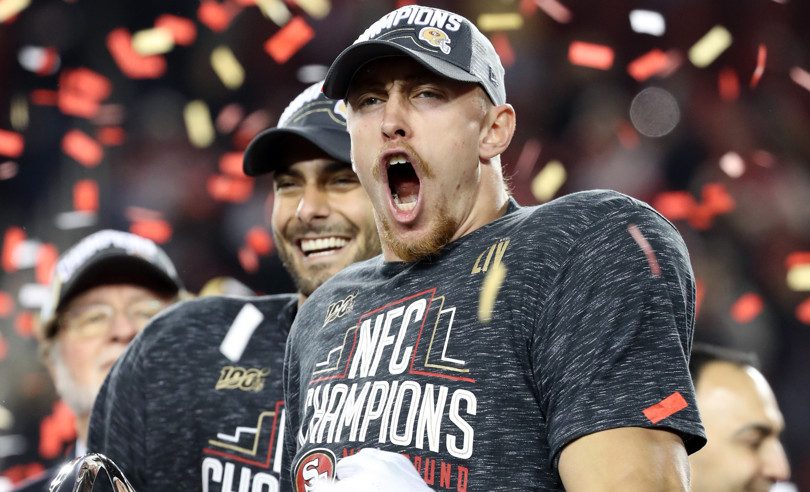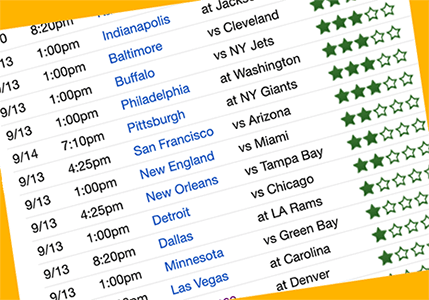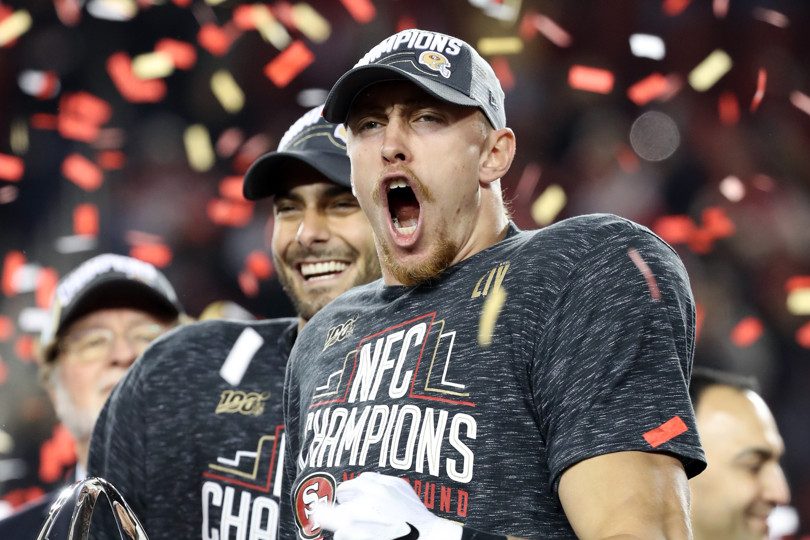San Francisco 49ers Super Bowl Analysis: From Doormats to Dominance
January 31, 2020 – by Jason Lisk

George Kittle and the San Francisco 49ers took the NFC by storm in 2019 (Photo by Kiyoshi Mio/Icon Sportswire)
San Francisco (15-3) took the NFL by surprise in 2019, rebounding from a recent history of losing seasons to put up a dominant season.
The 49ers franchise is back in the Super Bowl for the first time since February 2013. The team went to the NFC title game the next season under then-head coach Jim Harbaugh, but endured five straight non-winning years before returning to the playoffs this season.
In this breakdown, we’ll review how the San Francisco 49ers got to the Super Bowl, their strengths and weaknesses, and some key factors for the big game.

NFL Week 1 Picks
Content:
ToggleBetting – Survivor – Pick’em
Start Free TrialGet The Season
San Francisco’s Season: From Doormats to Dominance
The 49ers had gone only 10-22 in their previous two seasons with Kyle Shanahan as head coach. But those seasons were filled with numerous injuries, including quarterback Jimmy Garoppolo suffering an early season knee injury last year while playing Kansas City. When Garoppolo had played over the previous two seasons (after being acquired in a trade with New England), the team had gone 6-2.
However, last year’s disappointment also helped give rise to this year’s breakout. For example, the team was in position to draft defensive end Nick Bosa as the second overall pick in the NFL Draft, and Bosa has been one the most impactful players in the NFL as a rookie.
San Francisco was Dominant Right Away, Despite Low Preseason Expectations
San Francisco was much stronger than the world expected this season, and went about proving it straight away. In the preseason, the 49ers were generally projected at 8 to 8.5 wins in the betting markets, behind the defending NFC Champion Los Angeles Rams, as well as Seattle, in the NFC West.
They started the year with consecutive road wins, at Tampa Bay and then a demolition of Cincinnati. By the time they routed Cleveland in their fourth game, in prime time on Monday Night Football, and followed it up with a win over Los Angeles, we declared them NFC favorites for the Super Bowl.
Despite the 8-0 start, San Francisco had some challenges ahead. They lost at home to Seattle, at Baltimore, and at home to Atlanta in a six-week stretch. As a result, they still entered the final week of the regular season not knowing whether they would be hosting the playoffs in every round as the No. 1 seed, or having to go on the road for (likely) three straight games.
The 49ers also dealt with several injuries over the second half of the year, and were not as dominant in the latter half of the season. That changed with a week off, and the start of the playoffs. In the postseason and in better health, San Francisco again has looked like the dominant team that started the year at 8-0.
The Statistical Impact of the 49ers’ Injuries
Like Kansas City, San Francisco dealt with injuries to key players this season. As a result, our current predictive rating for the 49ers (8.7, good for a No. 3 ranking), which is based on game results this season, likely underestimates their true quality entering the Super Bowl.
To try to get a better idea of how strong a full-strength San Francisco is, we looked at their performance when specific key players played. To determine which players to include the analysis, we used the “Approximate Value” (AV) stat from Pro Football Reference, mostly because they calculate it for all positions, including offensive linemen and defensive players.
Here are the players from the 49ers who had at least a 0.6 AV per game this season, and didn’t play in every game:
CB Richard ShermanTE George KittleOT Joe StaleyOT Mike McGlincheyWR Deebo Samuel
To measure team performance we used our “Game Score” metric, which is essentially margin of victory, but adjusted for opponent strength and game location, and with some diminishing returns for big blowouts.
However, we’re dealing with small sample sizes of games here, so it’s important not only to consider raw Game Score, but also to blend it with prior expectations by adjusting it towards our preseason ratings, and toward how San Francisco played in the games where it did have some injuries.
San Francisco’s Injury-Adjusted Rating
Once we did all that, here’s what came out of the math blender:
Over the 7 games in which the 49ers had all of the above players healthy, San Francisco was 13.9 points better than an average NFL team.Make a final conservative adjustment blending that average with our prior expectations, and San Francisco played 10.2 points better than an average NFL team.
For context, Baltimore was our top-rated team this year, at 10.2 — and the Ravens were the highest rated team since 2012 New England.
Earlier injuries are indeed masking San Francisco’s true strength, and injury-adjusted predictive ratings would make the 49ers the best team in the league in most seasons. Interestingly enough, the same applies to Kansas City (see our Super Bowl analysis of the Chiefs).
One final note: This analysis doesn’t include the impact of linebacker Kwon Alexander missing games, because his Approximate Value per game was just a bit below the 0.6 cutoff. Looking only at games in which Alexander also played, the sample size gets really small. Only four games featured both Alexander plus all the players above all playing, and two of them were the 49ers’ two playoff games, in which Alexander played on a limited basis. Regardless, if you also adjust for Alexander’s absence, San Francisco gets a further boost, playing +4.2 points better per game, or +0.4 points per game better after our prior-expectations adjustment.
The Implied Super Bowl Result
If you look at our injury-adjusted raw Game Scores for San Francisco and Kansas City — which is a pretty dubious method due to the small sample size — you can justify a Super Bowl point spread anywhere between Kansas City as a 1.5 point favorite to San Francisco as a 2.5-point favorite.
If you adjust those Game Score values toward more reasonable expectations, it looks more like Kansas City as 1-point favorite (which is very close to where the line was at publication time, KC -1.5), or an even 50/50 tossup.
In short, two great teams are colliding in Super Bowl 54, and both San Francisco and Kansas City would be solid favorites against many other recent Super Bowl teams.
San Francisco 49ers, By The Numbers
If you want to look through a variety of team stats, both offensive and defensive, you can check out our NFL stats pages. Here is how San Francisco ranked in the regular season in various statistical categories.
| OFFENSE | DEFENSE | ||||
|---|---|---|---|---|---|
| Category | Number | Rank | Number | Rank | |
| Points | 479 | 2 | 310 | 8 | |
| Net Yards Per Pass | 7.4 | 3 | 4.8 | 1 | |
| Yards per Rush | 4.6 | 8 | 4.5 | 23 | |
| Third Down Conversion % | 44.6% | 4 | 32.4% | 2 | |
| Red Zone TD % | 54.3% | 21 | 61.4% | 25 | |
| Drive Scoring % | 44.3% | 5 | 29.0% | 3 | |
| Drive Turnover % | 12.0% | 20 | 14.2% | 6 |
San Francisco may not come across as an elite passing offense, but they are a low volume but high efficiency unit. You might be surprised to see San Francisco rank so poorly in red zone stats, both offensively and defensively. One can only imagine how dominant the 49ers would have been this year if they had performed better in the red zone.
Meanwhile, the rush defense, at least by yards per carry, is the weakest category for the defense. That is also the case for Kansas City. Can we collectively repeat that rush defense is not the primary driver of what makes a defense great?
San Francisco 49ers Offense: Key Notes
One key feature of Shanahan’s offenses (just like his father, Super Bowl winner Mike Shanahan with Denver) is the productivity of the running game, regardless of the identity of the back. This year, San Francisco ranked 2nd in total rushing yards and 1st in total rushing touchdowns, and did so without a running quarterback contributing to those numbers, as is the case with some of the other top rushing attacks.Running backs Raheem Mostert, Matt Breida, and Tevin Coleman all rushed for over 500 yards this season. Mostert, who bounced around to four other teams before getting his chance in San Francisco, is the surprise star from this backfield. He had an NFC Championship performance for the ages, totaling 220 rushing yards and four touchdowns in the blowout win over Green Bay.Beyond Garoppolo, the star of the offense is tight end George Kittle, who had over 1,000 yards receiving for the second year in a row. The team also added veteran wide receiver Emmanuel Sanders in a mid-season trade with Denver to boost the receiving group, and rookie Deebo Samuel led all wide receivers on the team in yards.While there will be plenty of talk about stopping the run against San Francisco, it has been games where the 49ers have not been productive passing where they have lost. Garoppolo averaged under 6 yards per attempt in only two games: the losses to Seattle and Atlanta.
San Francisco 49ers Defense: Key Notes
The 49ers defense is led by veteran cornerback Richard Sherman, who has revitalized his career after leaving Seattle.The defensive line also has four different players who have finished with at least six quarterback sacks. In addition to Bosa, the pass rush features Arik Armstead, DeForest Buckner, and Dee Ford. (Ford famously committed a crushing offsides penalty against New England while playing for Kansas City in last year’s AFC championship game, and faces his former team on Sunday.)The team has played most of the second half of the season without middle linebacker Kwon Alexander. He has returned for the playoffs, but played on a more limited basis. He practiced this week, again on a limited basis, and his involvement could be key in helping to slow down Patrick Mahomes. In the 10 games Alexander has played, San Francisco has allowed an average of only 13.4 first downs per game, compared to 22.4 first downs allowed in games he missed.

NFL Week 1 Picks
Betting – Survivor – Pick’em
Start Free TrialGet The Season
If you liked this post, please share it. Thank you! Twitter Facebook
NFL Football Pool Picks NFL Survivor Pool Picks NCAA Bracket Picks College Bowl Pool Picks College Football Pool Picks NFL Picks NBA Picks MLB Picks College Football Picks College Basketball Picks NFL Predictions NBA Predictions MLB Predictions College Football Predictions College Basketball Predictions NFL Spread Picks NBA Spread Picks MLB Spread Picks College Football Spread Picks College Basketball Spread Picks NFL Rankings NBA Rankings MLB Rankings College Football Rankings College Basketball Rankings NFL Stats NBA Stats MLB Stats College Football Stats College Basketball Stats NFL Odds NBA Odds MLB Odds College Football Odds College Basketball Odds A product ofTeamRankings BlogAboutTeamJobsContact
© 2005-2024 Team Rankings, LLC. All Rights Reserved. Statistical data provided by Gracenote.
TeamRankings.com is not affiliated with the National Collegiate Athletic Association (NCAA®) or March Madness Athletic Association, neither of which has supplied, reviewed, approved or endorsed the material on this site. TeamRankings.com is solely responsible for this site but makes no guarantee about the accuracy or completeness of the information herein.
Terms of ServicePrivacy Policy



